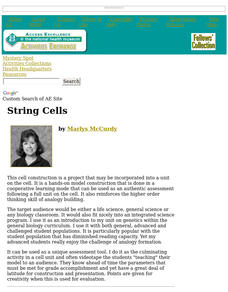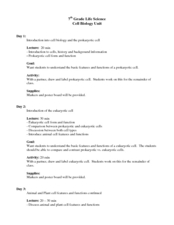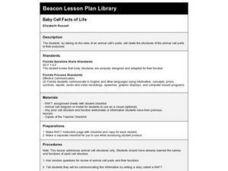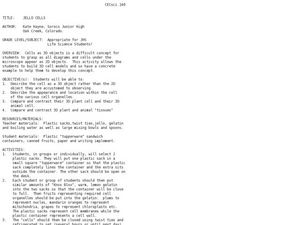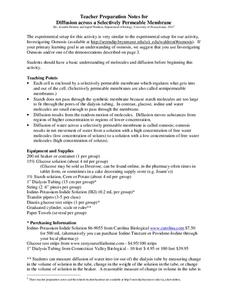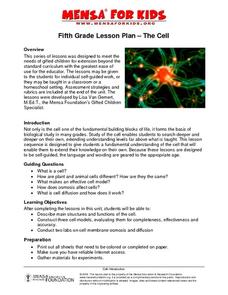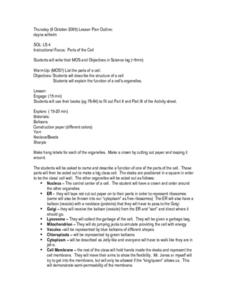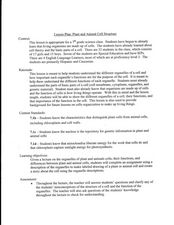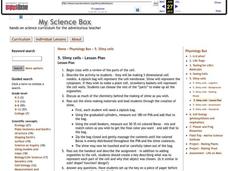Curated OER
Cell Structures and Their Functions
Life science learners investigate live cells. They examine wet mount slides of cyanobacteria and Elodea plants. They peer into the dynamic microscopic world of protists. Afterward, they construct a model of a cell, including rudimentary...
Curated OER
Slimy Cells
Students create three-dimensional cell models. They may choose to make either a plant or animal cell but must use a Ziploc bag as the cell membrane, slime for the cytoplasm, and strawberry baskets for the cell wall if making a plant...
Curated OER
String Cells
Use this resource to have your class learn about the cell. This resource walks learners through the construction of a model of a cell. This project is completed in a cooperative learning group, and reinforces the higher-order...
Alabama Learning Exchange
Edible Cell
Students identify cell parts and their function. In this animal cell lesson plan, students view a video clip and discuss cell components. Students create an edible replica of an animal cell using food items.
Curated OER
Cell (Biology)
Young scholars conduct a series of activities to explore the nature of cells. For this biology lesson, students observe plant and animal cells under the microscope and compare them. They differentiate osmosis and diffusion.
Curated OER
Cell Parts
Students identify parts of a cell. In this biology lesson, students create a simulated cell by using Jell-o, fruit roll ups, raisins, gum drops, and M&M's. Students construct the simulated cell and identify each part.
Curated OER
Baby Cell Facts of Life
Students examine the roles of an animal cell's parts, how each part relates to one another and then demonstrate their knowledge by writing a story about the animal cell structure.
Curated OER
Jello Cells
Middle schoolers create a three dimensional model of a cell. In this cellular structure lesson, students use gelatin, plastic bags, plastic containers, and fruit to construct a model of a cell. They compare the cells structures and stack...
Curated OER
Plant and Animal Cells
Students investigate parts of a cell. In this plant cell lesson, students determine the difference between plant and animal cells. Students discover that coral is an animal based on cell characteristics. Students create puppets to...
Curated OER
Those Cells Look Good Enough to Eat
Students explore the parts of the cell. In this cell lesson, students use foods to create cell models that represent the nucleus, cytoplasm, cell membrane, mitochondria, ribosomes, vacuoles, endoplasmic reticulum, and Golgi bodies...
Curated OER
Diffusion Across a Selectively Permeable Membrane
Learners investigate how water passes through cell membranes. In this biology lesson, students differentiate osmosis and diffusion. They illustrate the movement of water in both processes.
Curated OER
Hands-on Cells
Young scholars review the components of a cell and the differences between plant and animal cells by creating a three-dimensional model of each type of cell. In small groups, they use modeling clay and household object to construct their...
Curated OER
MAKING THREE DIMENSIONAL PLANT AND ANIMAL CELLS
Students create two different cells, one plant and one animal. In this plant and animal cell lesson students form groups and construct a part of a cell. Students then put them all together to form one plant or animal cell.
Curated OER
The Cell
Tenth graders explore the parts of a cell. In pairs, classmates construct a model of a eukaryotic cell, detailing its morphology and function. With the use of computer technology, 10th graders create cell book for middle schoolers. ...
Curated OER
Cell Cookie Lesson Plan
Students review the structure and fuctions of plant and animal cells. They use various types of materials such as sugar cookies and cake frosting for this lesson.
Curated OER
Cytoskeleton of a Cell
Students examine the cytoskeleton of a cell. They work together to build a structure with a certain number of materials. They share their "cell" with their classmates.
Curated OER
Parts of the Cell
Learners examine plant and animal cells to observe the organelles present in the cell, to match the function of each to the organelle on a cell model and to build a model of the plant or animal cell.
Curated OER
The Day an Egg Solved the Mystery of the Cell
Students conduct an experiment comparing human cells to chicken cells. In this cells lesson plan, students conduct an experiment to see how nutrition moves through cells and how to better take care of their bodies.
Curated OER
Cell Structure and Function
Students compare the organelles present in plant and animal cells. In this biology lesson, students create an analogy to easily remember their assigned organelles. They also research their function and write a creative story.
Curated OER
Cells and Cancer
Students idenitfy that cancer is a growth of mutated cells and that cancer cells are only one type of cell that causes disease in our body. They also identify that all eukaryotic cells contain a nucleus, cytoskeleton, and a cell...
Curated OER
Plant and Animal Cell Structure
Seventh graders identify the different parts and functions of the cell. In this biology lesson, 7th graders make a labelled diagram of either a plant or animal cell. They write a story about it.
Curated OER
Cell Works
Students identify the different parts of the cells and their functions. In this biology instructional activity, students create an analogy of a cell and its organelles. They make a poster and present it to class.
Curated OER
Slimy cells
Learners study the parts of a cell. In this chemistry lesson students complete an activity in which they make as much slime as they want.
Curated OER
Biology: Make a Model Cell
Students compare and contrast plant and animal cells and then create a model of the latter. They visit Websites to view the cells and answer questions about them. In pairs, students create cell models using plastic baggies, syrup,...


